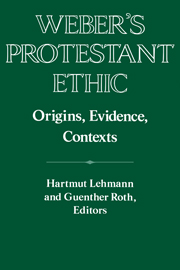Book contents
- Frontmatter
- Introduction
- Part I Background and Context
- Part II Reception and Response
- 10 The Longevity of the Thesis: A Critique of the Critics
- 11 The Use and Abuse of Textual Data
- 12 Biographical Evidence on Predestination, Covenant, and Special Providence
- 13 The Thing that Would Not Die: Notes on Refutation
- 14 Historical Viability, Sociological Significance, and Personal Judgment
- 15 The Historiography of Continental Calvinism
- 16 The Protestant Ethic and the Reality of Capitalism in Colonial America
- 17 The Economic Ethics of the World Religions
- 18 “Meet Me in St. Louis”: Troeltsch and Weber in America
- Index
16 - The Protestant Ethic and the Reality of Capitalism in Colonial America
Published online by Cambridge University Press: 05 January 2013
- Frontmatter
- Introduction
- Part I Background and Context
- Part II Reception and Response
- 10 The Longevity of the Thesis: A Critique of the Critics
- 11 The Use and Abuse of Textual Data
- 12 Biographical Evidence on Predestination, Covenant, and Special Providence
- 13 The Thing that Would Not Die: Notes on Refutation
- 14 Historical Viability, Sociological Significance, and Personal Judgment
- 15 The Historiography of Continental Calvinism
- 16 The Protestant Ethic and the Reality of Capitalism in Colonial America
- 17 The Economic Ethics of the World Religions
- 18 “Meet Me in St. Louis”: Troeltsch and Weber in America
- Index
Summary
“We not only have Liberty to labour in moderation,” Thomas Chalkley (1675-1741) of Philadelphia wrote in his Journal, “but . . . it is our Duty so to do. The Farmer, the Tradesman, and the Merchant,” this devout Quaker continued, “do not understand by our Lord's doctrine, that they must neglect their Calling, or grow idle in their Business, but must certainly work, and be industrious in their Callings.” “I . . . followed my Business with Diligence and Industry,” Chalkley testified, and consequently “throve in the Things of the World, the Lord adding a Blessing to my Labour.”
Chalkley worked with equal diligence for things of the spirit. He sought converts while on business in Bermuda in 1716; warned his son-in-law, an avid reader, to be certain “that thy chief Study in Books may be the holy Scriptures”; and, at his death in 1741, bequeathed 111 religious books to the lending library of the Philadelphia Monthly Meeting. But Chalkley's major contribution to Quakerism was his Journal. Like the journals kept by many other “public friends,” his Historical Account of the Life, Travels, and Christian Experiences, of that Antient, Faithful Servant of Jesus Christ, Thomas Chalkley (1749) was published to set an example for posterity and to further the progress of the Truth.
- Type
- Chapter
- Information
- Weber's Protestant EthicOrigins, Evidence, Contexts, pp. 327 - 346Publisher: Cambridge University PressPrint publication year: 1993
- 3
- Cited by

